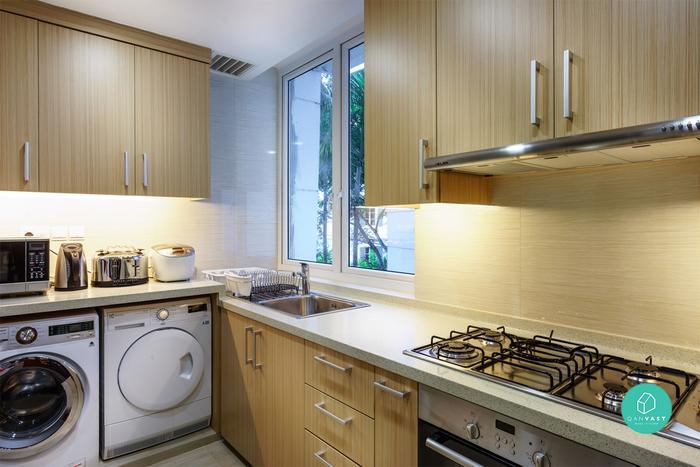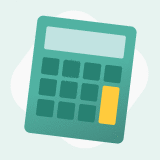They say your home is a safe haven.
But is it, really? While things may seem fine on the surface, it doesn’t necessarily mean it is. If anything, your safe and private sanctuary is constantly in danger of all sorts of hazards and risks - sometimes even from the inside.
That's right, it's often the common, overlooked items that result in the worst home disasters - think fires and explosions! With the help of HDB appointed insurer Etiqa, we reveal 5 everyday household items that are surprisingly dangerous, and how homeowners can keep them in check with the right safety tips.
1. Clothes Dryer Lint
Guilty of: Causing house fires, electrical explosions

Interior Designer: Imagine By SK66
If you own a clothes dryer at home - it’s time to pay this piece of appliance a little more attention. While most of us know that lint (tiny strands of fibres from clothes) often accumulate within a dryer as a result of clothes tumbling about; did you know that it is also highly flammable?

Pair this easily combustible debris with the electrical wires in a dryer, and you have a recipe for disaster. Because of lint’s larger surface area, a stray electrical spark is enough for it to catch fire and spread to the rest of the appliance. Who would have known something so tiny could cause so much damage?

What You Should Do:
- Clear the lint trap after each use
- Always clean your vents and exhaust ducts regularly.
- Have your dryer professionally cleaned every 1 - 3 years. This will help get rid of lint more thoroughly and increase the machine’s efficiency
- Check if your dryer is placed too close to the wall - doing so crushes the vents which could result in more lint accumulated and reduce the airflow, causing the machine to overheat as well.
2. Toilet Paper (and anything else you throw into your toilet bowl)
Guilty of: Causing clogged sewage pipes, burst pipes

Interior Designer: The Scientist
If you've read the news, you'd have probably heard about this plumbing horror story where a burst refuse pipe caused a couple's toilet bowl to regurgitate faecal matter all over their Punggol flat. After investigation, remnants of renovation debris were found to be the cause of the disaster. The aftermath? An entire house disinfected and redone - something even you wouldn’t even wish on your worst enemy.

Interior Designer: Intrigue-D Design Consultancy
Which comes to our point. Yes, toilet bowls are meant for waste - but they are not waste baskets. While Singapore’s sewage pipes are large enough to take in stuff like your bodily waste and toilet paper, they can still clog and accumulate in jagged areas. Needless to say, anything thicker and harder to dissolve than that is an absolute no-go in your WC.

What You Should Do:
- Don’t throw hard-to-dissolve items into your toilet bowl - think wet wipes, facial tissues, cotton buds, and even writing paper.
- Likewise, no grease, oils or fats down the ‘bowl. These substances will ‘stick’ onto the walls of your sewage pipe, clogging it over time as well.
- The type of toilet paper you use counts as well. While better quality, 3-ply toilet papers do feel good to the touch, they are harder to dissolve and will clog. Surprisingly, cheap, low-ply options which are easily dissolved are also better for your pipes (and your wallet!).
3. Loose or Mismatched Lighting Components
Guilty of: Causing fires, electrical explosions

Interior Designer: Posh Home
Shattering lights don’t only happen in horror movies. But when they do occur, that’s when you know you’re in for a real nightmare.

Interior Designer: Third Avenue Studio
We may be so used to turning on the lights every night, but that doesn’t make them any less dangerous. A whole host of safety hazards arise as a result of lighting faults, like fires, electric shocks, explosions (plus the risk of exploding glass shards) due to problems like loose sockets, mismatched bulb and socket wattages or vibrations.

What You Should Do:
- Check if your light bulb wattage matches the wattage of the lighting socket. If the bulb has a higher wattage than recommended for the socket, it may lead to overheating and explosions.
- Check for any loose power outlets/sockets and switches and ask a professional electrician to replace or secure them.
- Get higher quality bulbs that are made with better materials, or bulbs that have a protective, plastic layer to prevent them from shattering as easily.
4. Cooking Oil and Wine (Plus these other types of foodstuffs)
Guilty of: Causing fires

Interior Designer: Icon Interior Design
Yes, it’s always handy to have your olive oil and white wine on standby for a mean Vongole dish, but maybe think twice - if you’re using a gas stove. You may be surprised how many homeowners actually disregard this important rule in kitchen safety: Never put flammable stuff near an open flame (unless you're cooking it).

Interior Designer: DB Studio
Aside from the usual oil and alcohol, there are a couple of not-so-obvious food stuffs and kitchen accessories that are surprisingly explosive. For instance, basic ingredients like flour and sugar are flammable - and may ignite when spilled onto an open flame. Likewise, condiments like your cinnamon and orange shavings have a tendency to catch fire.

Interior Designer: Icon Interior Design
What you should do:
- Keep these flammable items stored somewhere enclosed from any fire sources, like your cabinets and drawers.
- Or put them exposed, but at a safe distance away. If possible, place those items on the counter opposite your gas stove to reduce the risk of spills onto open flame.
- Install a small fire extinguisher to help subdue any sudden flames in time.
5. Door Locks and Windows
Guilty of: Letting unwanted visitors (aka robbers/burglars) enter your home.

Interior Designer: Bowerman
For the most part, Singapore is ultra-safe. We don’t hear much about robberies or home intrusions as much as we hear about the weird stuff happening in Yishun (sorry, couldn’t resist). But they could still happen.

Interior Designer: Bowerman
Especially if you and your family go on vacation, or if there’s hardly anyone at home for most of the day, your house could be a prime target for professional burglars or malicious passers-by looking for a quick score. Unless you want to come back to a looted home, your smart door lock and closed windows are not enough in terms of security.

What You Should Do:
- Double the security of your front door with a deadbolt lock. This makes it harder for intruders to enter, as it requires the turn of the correct key in order to release the lock.
- Install an smart home security system that will notify you of any unauthorised entries.
- Similarly, give your home the illusion that it’s occupied, by turning on certain lights before you go.
- Invest in safety films for windows. These films help to hold the window glass from breaking, making it harder and longer for burglars to break through.
For an even greater peace of mind.

Interior Designer: Charlotte's Carpentry
Identifying these items and applying these safety tips here will certainly lower the chances of a disaster happening to your home. But sometimes, trouble may come from nowhere or be out of one’s control.
While we can’t stop a freak accident or a lightning strike from befalling our homes, a Home Contents protection scheme can at least provide a peace of mind. Covering a wide variety of perils, including fires, burst pipes, natural disasters and theft, Etiqa’s ePROTECT home contents insurance covers any loss or damage of contents inside your home, plus cost of renovations, medical expenses and removal of debris.
Because losing a home may be difficult, but rebuilding one shouldn’t be.
Safeguard Your Home with Etiqa.

Specialising in both personal and commercial insurance policies, Etiqa has been HDB’s Appointed Fire Insurer since 2010. To better complement HDB’s Fire Insurance Policy, Etiqa’s Home Contents plan, ePROTECT home, was developed to provide homeowners a complete peace of mind for one of life’s greatest investments, offering comprehensive protection on house contents and from various home-related perils.
For more information on its policies, terms and conditions, check out Etiqa’s webpage for ePROTECT home, it’s Home Contents Insurance.
Purchase ePROTECT home here.
Introducing ePROTECT maid
Provide you and your trusted home helper with a protection plan that covers any household risks and injuries she might encounter at home with Etiqa’s ePROTECT maid.
Benefits include coverage of up to $60,000* for any personal accidental death or permanent disablement, hospitalisation and surgical expense coverage and cover for other liabilities up to $10,000. As employers, you will also be covered for termination and re-hiring expenses, recuperation, temporary help and security bond expenses.
- With effect on 1st October 2017, Ministry of Manpower (MOM) has revised the Minimum Sum for Personal Accidents to $60,000. Etiqa has raised all ePROTECT maid Personal Accident covers to $60,000 before 1st October - at no premium increase.

 Get a budget estimate before meeting IDs
Get a budget estimate before meeting IDs